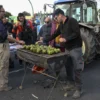Zanyiwe Ncube, with unwavering focus, carefully poured her portion of precious golden cooking oil into a plastic bottle at a food aid distribution site nestled deep within rural Zimbabwe. Despite the relief brought by this assistance, funded by the U.S. government to alleviate the severe drought gripping the nation, Ncube’s gratitude was tinged with sorrow as aid workers gently announced that this would mark their final visit.
Among the 2,000 recipients in the Mangwe district of southwestern Zimbabwe, Ncube and her 7-month-old son, cradled on her back, received rations of cooking oil, sorghum, peas, and other essentials. This assistance, facilitated by the American aid agency USAID and executed by the United Nations’ World Food Programme, aims to support some of the 2.7 million rural Zimbabweans threatened by hunger due to the relentless drought gripping large swathes of southern Africa since late last year.
This crisis has devastated crops, upon which tens of millions depend for sustenance, exacerbating food insecurity across the region. The effects have reached crisis levels in neighboring Zambia and Malawi, with both nations declaring national disasters. Meanwhile, Zimbabwe teeters on the brink of a similar declaration, as the drought’s reach extends to neighboring countries like Botswana, Angola, Mozambique, and Madagascar.
In Mangwe, individuals of all ages lined up for aid, some equipped with donkey carts or wheelbarrows to transport their provisions home. Amidst the dusty landscape, Ncube, 39, reflected on her usual routine of harvesting crops to feed her family, a task now thwarted by the driest February on record in Zimbabwe.
Traditionally, the early months of the year are considered lean, but this year’s circumstances offer little hope for replenishment. Francesca Erdelmann, the World Food Programme’s country director for Zimbabwe, emphasized the severity of the situation, noting that while last year’s harvest was poor, this season has been even more devastating.
As aid agencies grapple with limited resources amidst a global hunger crisis and reduced humanitarian funding, millions across southern Africa face an uncertain future. Ncube, like many others, is left calculating how long the provided assistance will sustain her family, desperately hoping to stave off the specter of malnutrition looming over her youngest child’s fragile existence.





















































Comment Template